Shifting Alliances in the Accreditation of Higher Education: On the ...
Shifting Alliances in the Accreditation of Higher Education: On the ...
Shifting Alliances in the Accreditation of Higher Education: On the ...
You also want an ePaper? Increase the reach of your titles
YUMPU automatically turns print PDFs into web optimized ePapers that Google loves.
Of course, this is a highly questionable premise. Government agencies are subject<br />
to rent-seek<strong>in</strong>g as well as political pressures and self-<strong>in</strong>terest; it is difficult to conceive <strong>of</strong><br />
a situation <strong>in</strong> which government agencies would be truly unbiased when decid<strong>in</strong>g<br />
amongst <strong>the</strong> compet<strong>in</strong>g demands <strong>of</strong> various stakeholders. The po<strong>in</strong>t that <strong>the</strong> authors are<br />
try<strong>in</strong>g to make, however, is that because a public agent is primarily accountable to <strong>the</strong><br />
government and not to a private stakeholder, it will be more likely to rema<strong>in</strong> unbiased<br />
than a private agent, which may be exclusively dependent upon one stakeholder.<br />
There are a few assumptions <strong>in</strong> Mattli and Bü<strong>the</strong>‘s hypo<strong>the</strong>sis that must be<br />
addressed. To beg<strong>in</strong> with, <strong>the</strong>re is an unstated assumption that <strong>the</strong> primary goals <strong>of</strong> <strong>the</strong><br />
two stakeholders do not co<strong>in</strong>cide. This may be a valid assumption <strong>in</strong> most <strong>in</strong>stances, but<br />
<strong>in</strong> <strong>the</strong> case <strong>of</strong> accreditation it will be argued that when <strong>the</strong> federal government <strong>in</strong>itially<br />
delegated authority to <strong>the</strong> accreditation associations, <strong>the</strong> role that <strong>the</strong>y wanted <strong>the</strong><br />
accreditation associations to play did not conflict <strong>in</strong> any obvious way with <strong>the</strong> goals <strong>of</strong><br />
<strong>the</strong> higher education community. Certa<strong>in</strong>ly one could argue that <strong>the</strong>ir goals were not<br />
identical; <strong>the</strong> federal government was concerned primarily with dist<strong>in</strong>guish<strong>in</strong>g which<br />
schools were legitimate and which were not so that <strong>the</strong>y could put an end to <strong>the</strong><br />
tremendous amount <strong>of</strong> fraud that had been occurr<strong>in</strong>g s<strong>in</strong>ce <strong>the</strong> passage <strong>of</strong> <strong>the</strong> GI Bill.<br />
They used <strong>the</strong> accreditation associations as gate-keepers to federal funds. The higher<br />
education community, however, had several uses for <strong>the</strong> accreditation system, not <strong>the</strong><br />
least <strong>of</strong> which was to assist <strong>in</strong> <strong>the</strong>ir own self-improvement. None<strong>the</strong>less, <strong>the</strong> goals <strong>of</strong> <strong>the</strong><br />
federal government and those <strong>of</strong> <strong>the</strong> higher education community <strong>in</strong>itially co<strong>in</strong>cided very<br />
43


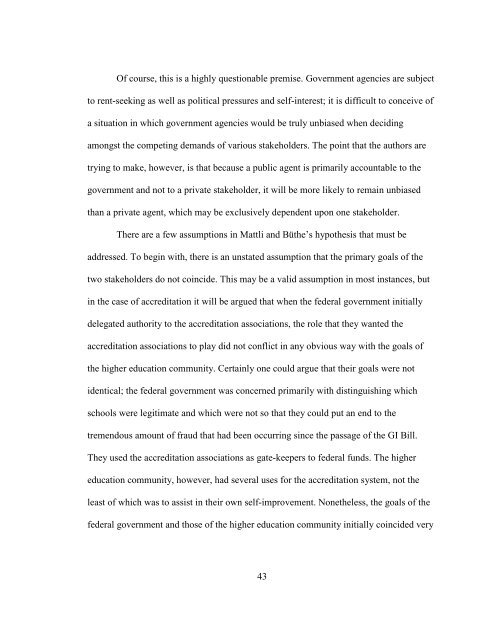
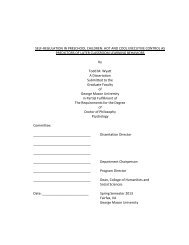
![[Sample B: Approval/Signature Sheet] - George Mason University](https://img.yumpu.com/21978828/1/190x245/sample-b-approval-signature-sheet-george-mason-university.jpg?quality=85)
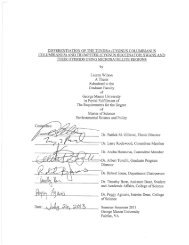
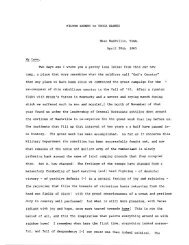
![[Sample B: Approval/Signature Sheet] - George Mason University](https://img.yumpu.com/18694905/1/190x245/sample-b-approval-signature-sheet-george-mason-university.jpg?quality=85)
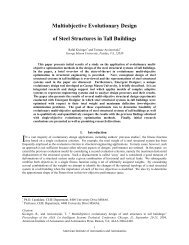
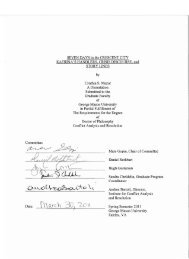
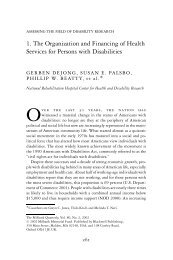
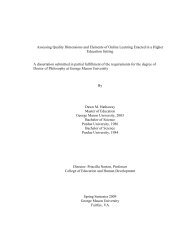
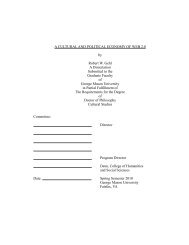
![[Sample B: Approval/Signature Sheet] - George Mason University](https://img.yumpu.com/18694552/1/189x260/sample-b-approval-signature-sheet-george-mason-university.jpg?quality=85)
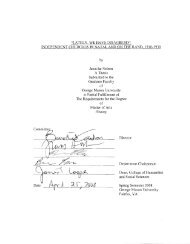
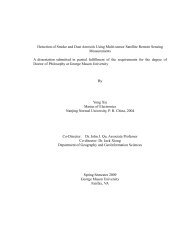
![[Sample B: Approval/Signature Sheet] - George Mason University](https://img.yumpu.com/18694474/1/190x245/sample-b-approval-signature-sheet-george-mason-university.jpg?quality=85)